Graham Reid | | 5 min read
Utah Carrol
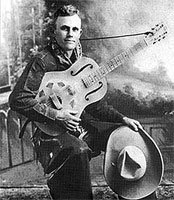
Some musicians are so close to the source they are almost part of it.
The young Rolling Stones -- despite their cultural, emotional and physical distance from American blues – heard that music speak to them and, in their emulation of their heroes like Jimmy Reed, Middy Waters, Howling Wolf, Willie Dixon and others, located themselves as part of the lineage.
When they first went to America they immediately headed to Chess studios in Chicago to record and meet some of these people.
In subsequent decades they performed with and befriended many of these people and so were getting the information from the source in a way that subsequent generations simply couldn't.
So too with Carl T Sprague, a man who is at best a footnote in country music today because it was all so long ago and, worse, he sang songs which are woefully unfashionable these days.
In the Twenties and Thirties, Sprague sang cowboy songs and was known as The Original Singing Cowboy.
It's hard to know when songs of the campfire and the open range started to fall from public popularity. Gene Autry was the most visible star in the genre from the Thirties onward, largely thanks to his affable demeanour and appearances in almost 100 Hollywood films and was a television star in which he mostly played a classy looking cowboy who sang like Bing Crosby in chaps.
By the time he retired in the early Sixties (when he was in his late 50s), the American landscape had changed considerably. The urban drift disconnected many from the heartland, the image of cowboys as romantic figures was changing and they were increasingly perceived as loners, frequently violent and troublesome culturally aberrant outsiders. They might have herded cattle but they also ran roughshod over sheep herders, their role marginalised Native Americans . . . Enter spaghetti Westerns, and Clint Eastwood as the Man With No Name never picked up a guitar under endless blue skies and sang about “little doggies”.
Former stars like singer Tex Ritter and actor Fess Parker (who played both Davy Crockett and Daniel Boone in popular television shows in the Fifties and Sixties) were no match for the neo-realist Westerns, and singing cowboys just began to look ridiculous.
Cowboys and their songs of the land, the outdoor life, ranchers and rodeos gradually slipped away.
And someone like Carl T Sprague who had been enormously famous passed into obscurity.
But Sprague was an interesting character because although his catalogue is as small as Robert Johnson's – just thirtysomething songs recorded in his heyday – he'd learned the cowboy songs from the source. Real cowboys.
Sprague was born in 1895 near Houston in Texas and grew up on the family ranch where the family and ranch hands would sit around the campfire and sing country and cowboy songs.
He learned the songs from men who had grown up with wagons on the dusty trail and were now entering the era of the automobile. His uncle took cattle drives from Texas to Kansas and the young Carl went with him, picking up the songs and stories along the trail. Although that world of the cowboy was ending – trains would soon enough ship cattle faster and get them to markets and railheads in better condition – there must have been something ineffably romantic in the songs which appealed to the young Carl.
Although he played guitar and sang – apparently also toting around a copy of John A Lomax's anthology Cowboy Songs and Other Frontier Ballads -- he went to Texas A&M (Agricultural and Mechanical College northwest of Houston). He played in the college band but also coached in the athletic department.
Ironically it was another of Elsewhere's WE NEED TO TALK ABOUT . . . characters whose music made him consider a career in recording.
In 1925 he heard the famous Prisoner's Song by Vernon Dalhart (a man with so many performing names it is almost impossible to cite them all). Inspired by the song and the possibilities of recording himself, he approached the Victor label and in August that year spent three days at their studio on New Jersey where he recorded 10 sides.
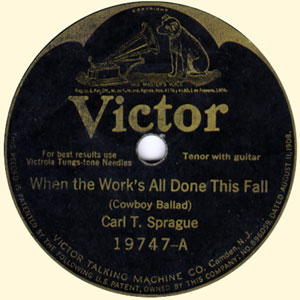 His first release was When
the Work's All Done This Fall, a melodramatic and tragic tale of a
young cowboy killed in a stampede he tries to stop. It was an instant
hit – the flipside was equally popular, Bad Companions about a young
man lead into wrongdoing by his pals.
His first release was When
the Work's All Done This Fall, a melodramatic and tragic tale of a
young cowboy killed in a stampede he tries to stop. It was an instant
hit – the flipside was equally popular, Bad Companions about a young
man lead into wrongdoing by his pals.
The 10” disc sold almost 800,000 copies by some accounts and Sprague was back into the studio to record even more songs, not all of them in the cowboy genre.
His other big hit was The Dying Cowboy in '26 and in Utah Carrol he again addressed death on the trail (this time of an attractive herd boss' daughter).
But this is where he started . . .
When The Work's All Done This Fall
Bad Companions
Sprague also lamented the passing of the lifestyle he knew and had heard of in songs like The Last Longhorn, Here's to the Texas Ranger and The Cowboy's Dream. He sang of The Mormon Cowboy and Following the Cowtrail, the war ballad Two Soldiers and brought a yearning spiritual element to songs like Rounded Up in Glory, The Cowboy in Church and the standard Oh Bury Me Not On The Lone Prairie.
There might be some who would – wrongly – hear considerable sexual innuendo in If Your Saddle is Good and Tight. (“Don't step into your saddle until you know she's good and tight”)
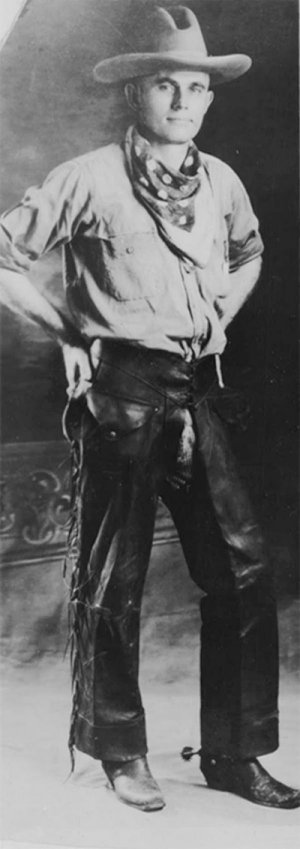 He adopted the archetypal
cowboy look with stetson, bandana, range shirt, boots and chaps . . .
all of which must have been familiar from his childhood so not really
“stage clothes” at all.
He adopted the archetypal
cowboy look with stetson, bandana, range shirt, boots and chaps . . .
all of which must have been familiar from his childhood so not really
“stage clothes” at all.
Although he might not have been the first to record cowboy songs – although it is hard to find who might have beaten him – he was certainly the most popular of his day and his plain, melodically unadorned style with simple guitar accompaniment set the standard for the many who would follow.
Oddly enough after recording his small body of work his recording career came to a halt – sales were admittedly on the decline – and he continued to work at Texas A&M then, before being drafted in World War II, he went through various jobs from selling life insurance (and its corollary, cemetery plots) to running a petrol station/grocery store.
After the war he wasn't entirely forgotten and appeared at folk festivals but, until 1972 when a German label got him back into the studio for an album, his singing was mostly reserved to leading the choir at his local Baptist church in Bryan, Texas, his hometown where he died in early '79.
Cowboy songs may be unfashionable these days -- somewhat primitive, sentimental and clumsy in their obvious rhyme schemes – but in the hands of Carl T Sprague they can possesses some of the elemental quality of the blues from the same period.
Sprague sang of a world which was rapidly passing in the early 20th century. He first recorded in the year John Logie Bell transmitted the first grayscale television image, Hitler published the first part of Mein Kampf and Mussolini got bellicose, F Scott Fitzgerald's Great Gatsby appeared celebrating “the jazz age”, and the Chrysler Corporation was founded.
Cars had replaced horses and the Old West was becoming a memory . . . but Carl T Sprague was there to preserve what he knew of that world, a landscape as open as the prairie where men worked hard on the lonesome trail, good women were either back at home or but a figment glimpsed in the firelight under a star-scattered sky.
And that's why we need to talk about Carl T Sprague.
For other articles in the series of strange characters in music, WE NEED TO TALK ABOUT . . . go here.

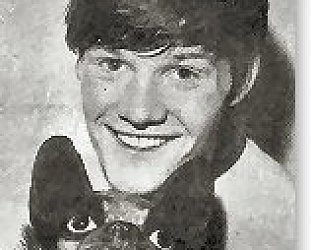
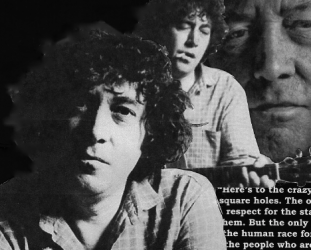
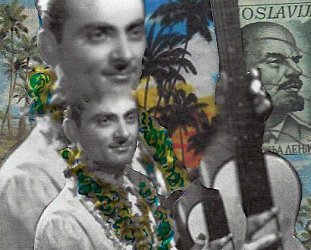
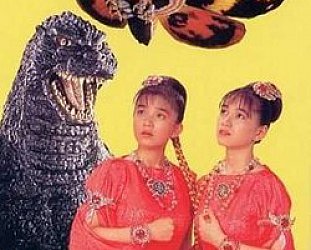
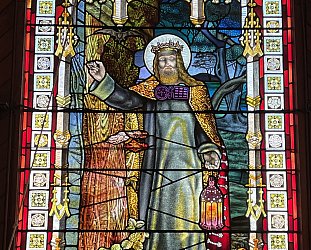
post a comment